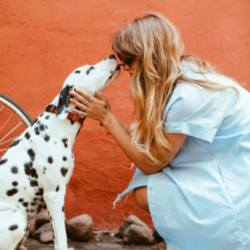
Many dog owners fail to realize the importance of potty training. Potty training should start as soon as your pet sets foot in your home. Failure to have your pet trained soon will lead to a lot of additional work. This could also cause you a lot of anxiety. It’s important to know how to properly train your dog so that they learn to tell you when they need to go outside to eliminate.
Dogs are habit animals. They will learn a certain behavior if they are often repeated. If they are inside the home for long periods of time, they will be more prone to making your home their personal toilet. Because dogs are creatures of habit, it is a good idea to teach them to tell you when it’s time to get up and go outside.
Some people think that potty training is cruel to let a dog out of the home to relieve themselves because they look cute and you feel like they’re taking the neighborhood for a walk. This is far from the truth.
Potty training is a very important step in establishing good communication with your pooch. They will learn if you’re clear and consistent with the rules. Starting early makes it easier for your dog to understand what you want and they’ll pick it up fast.
One of the top dog training tips is to reward your dog for good behavior. It can be in the form of a treat or someone saying “good boy!” Every dog is different so watch to see how they respond to praise and pats.
They will start to understand that if they follow the rules, they get praise and pets. They’ll soon realize that every time they go outside, it’s going to get them a reward.
Potty training is one of the first things you’ll want to teach. It’s important to stress the importance of taking him outside right after he wakes up. Just make sure you’re not near a power pro generator since the noise would scare the pup into not peeing. That way he’ll know right away what he’s supposed to do. Make sure you have a lot of treats ready for your pooch.
If you’re too busy for that, then try to take him out every 30 minutes during the day. Soon he’ll realize that outside means potty time and he’ll keep it outside no matter what the weather is like. You might also want to try to take him out first thing in the morning before he gets any morning energy.
It’s easy to get carried away and start petting and playing with your dog. But that’s also the time you should nip that behavior in the bud so that he knows that that’s not the way to do things. Let him know that what he’s doing is not OK.
Dogs need to know that you’re the boss. Once they learn that they won’t get anything from barking and whining, they’ll stop. Some canines are more stubborn than others, but it’s usually the owner that wets up potty training. Most people get whining and barking out of fear.
If you’re armed with the right information, patience, and compassion, potty training should go much easier. Here are a few tips for getting through that stage.
-Remember:Just because he’s a puppy, doesn’t mean he can’t act like a grown-up.
-Reward him for being good. Don’t punish him for not behaving.
-You have to let him know that peeing in the house is not OK. Once he has an accident, let him know he’s done a bad thing.
-Spend some time playing with your pet. If you’re too busy for that, find someone who will play with him. Dogs get bored just like people.
-If you know someone that uses potty training bells, teach your dog to ring them so he’ll get set to know his own alarm clock.
-Be sure to show him the right place to go. Don’t punish him if he doesn’t know this.
-Make it a daily habit to take your dog out for a walk. If he doesn’t know where he’s supposed to go, he won’t try to hide it.
-Once he’s trained, get him a petpassport.
-And finally, just remember that it takes time and consistency to potty train a puppy. It will not happen overnight.




